非谓语动词-(1)
英语非谓语动词用法详解(1)

英语非谓语动词用法详解(1)一、单项选择非谓语动词1.After a decade or so, out of choices, he returned to where he’d begun, ashamed at having so little to show for his wanderings.A.being run B.runningC.to run D.having run【答案】D【解析】【详解】考查现在分词。
句意:大约十年后,在没有选择的情况下,他回到了他开始的地方,为自己的拼搏没有什么收获而感到羞愧。
run out of “用光,耗尽” 与主语he在逻辑上是主动关系,且表示的动作明显发生在return之前,所以用现在分词的完成时having run of。
故D 选项正确。
【点睛】非谓语动词是考试考查的重点,要掌握它的用法。
首先,要弄清楚填空处要填的是非谓语。
其次,要知道非谓语动词的三种形式:现在分词表示主动进行、过去分词表示被动完成、动词不定式表示目的和将要。
再次,要知道非谓语动作与谓语动作是同时发生还是先后发生,还是将要发生。
其中分词做状语的考查尤为重要。
分析句子可知,本句的主语为he,谓语为returned, run out of “用光,耗尽”为非谓语与主语he在逻辑上是主动关系,且表示的动作明显发生在return的之前,所以用现在分词的完成时having run of。
故D选项正确。
2.Don't turn a deaf ear to the advice which will make a ________to your future.A.mess B.differenceC.fuss D.remark【答案】B【解析】不要对能够对你未来产生影响的建议掩耳不闻。
make a different to对什么有影响,是固定短语,所以选B。
3.Shortly after suffering from a massive earthquake and ________ to ruins, the city took on a new look.A.reducing B.reduced C.being reduced D.having reduced 【答案】C【解析】【详解】考查动名词的被动语态。
非谓语动词知识点总结(1)

必备英语【初中英语】非谓语动词知识点总结一、非谓语动词1.The teachers often tell us ________ in the river. It's dangerous.A. not swimB. don't swimC. not swimmingD. not to swim【答案】 D【解析】【分析】句意:老师经常告诉我们不要在河里游泳。
太危险了。
tell sb not to do sth告诉某人不要做某事。
动词不定式的否定结构,not to do sth.故选D。
【点评】此题考查动词不定式。
注意动词不定式的否定结构not to do sth。
2.To my surprise, Daniel's parents allowed him ___________ Shanghai Disneyland with me.A. to visitB. visitingC. visitD. visits【答案】 A【解析】【分析】句意:让我吃惊的的,戴尔的父母允许他和我去上海迪士尼乐园。
allow sb. to do sth.允许某人做某事,固定短语,故选A。
【点评】此题考查动词不定式。
注意固定短语allow sb. to do sth。
3.—Jack hasn't taken his piano lessons for a long time.—He is considering _________ his piano course and spending more time on his study.A. to dropB. to throwC. droppingD. throwing【答案】 C【解析】【分析】句意:——Jack很久没有上钢琴课了。
——他在考虑放弃钢琴课,把更多的时间花在学习上。
consider doing sth考虑做某事。
drop放弃;丢掉;throw扔掉。
非谓语动词有3种形式(1)

非谓语动词有3种形式(1)非谓语动词有3种形式:不定式、动名词和分词主动被动一般式to do to be done进行式to be doing完成式to have done to have been done一作主语1.To see is to believe.2. It’s difficult (for us) to learn English.3. It’s foolish of h er to believe him.= She is foolish to believe him.二作表语1. His aim is to win the first prize.2. All we can do is (to) wait.One’s dream / aim / ambition / wish / The first step / What I want to do is to…三作宾语1. He demanded to be told the truth.2. He pretended to be doing his homework / to have fallen asleep when Mother came in.(decide / fail / manage / refuse / pretend / choose / agree / hope/ plan / promise / make up one’s mind + to do)3.I don’t know what to do.(decide / find out / know / learn / consider etc + 疑问词+ to do)4. Anyone can become a better scholar if he wants to.5. ---Are you on holiday? ---No, but I’d like to be.四作宾补或主补1. I’ll have him say something at the meeting.have sb do = get sb to dofeel; hear / listen to; let / have / make; see / watch / look at / notice / observe sb do但被动语态要+ to, let 例外Listen to me read the text.He is often listened to to sing the song.He was let go by the police.2. He ordered his men to fire.wish / advise / persuade / allow / permit / want / tell / ask / expect / order / require / request sb to dosuggest / hope / agree / demand / arrange sb to do3. He is said to be doing the work of next year.It’s said that he is doing the work of next year.sb + seem / appear / happen / be said / be reported / be known /be found / be believed + to do / to be doing / to have ( been) doneIt + seem / appear / happen / be said … / be believe that….六作定语1. I have a lot of work to do / no pen to write with.2. the first to come / to be awarded the Nobel Prize3. the last person to do such a thing 最不愿意做…的人4. the house to be built next year比较: the house being built now / build last year七作状语(目的、原因、结果或条件)目的to / in order to / so as to结果enough to / too…to / so…as to / such…as to / only to1. The bus stopped to pick up passengers.2. He set out early in order to / so as to catch the first bus.= In order to / To catch the first bus he set out early.3. I’m sorry to have kept you waiting.4. I hurried to school only to be told it was a holiday.only to do sth 表示出于预料之外的结果不定式的否定形式She kept silent about the accident so as not to lose his job.不定式的完成和被动式The book seems to have been translated into English.但是: The book is difficult to understand.I have a letter to write / a lot of work to do.He is to blame for the accident.Ⅱ动名词具有名词的性质主动被动一般式doing being done完成式having done having been done一作主语1. Seeing is believing. = To see is to believe.2. It’s no use / no good / useless doing sth. It’s no use crying over spilt milk.3. Being forced to leave the classroom made him feel embarrassed.二作表语1. My job is teaching English.比较: One’s dream / aim / ambition / The first step is to do sth.动名词作表语, 可与主语交换位置, 句子成立; 现在分词则不能。
非谓语动词(1)

1. It is better to die on one’s feet than____. A. living on one’s knees B. live on one’s knees C. on one’s knees D. to live on one’s knees 2.___ is to arrange them in groups or sequences according to a plan. A. Things classified B. In classifying things C. As classification of things D. To classify things
4.在cannot but, cannot help but, can’t choose but, had better, would (will, could) you please, may (might) as well, would rather, would sooner等习惯用法中跟不 带to的不定式。 Would you please drive me home? We had better start at once.
省略to 的不定式
1、表示感觉的动词如feel, see, hear, watch, observe, listen to, look at, notice 以及使役动词let, make, have等后面作宾 补的不定式省去to。 I felt the house shake. Have you noticed her cry?
2.help后的不定式可带to,或不带to, 但在被动语态时,to 不可省略。
高考英语语法复习——非谓词动词

•
• • • •
5. (07 全国卷) I smell something _________ in the kitchen. Can I call you back in a minute?
A. burning B. burnt C. being burnt D. to be burnt 6. (09 北京卷,28) All of them try to use the power of the workstation ________ information in a more effective way. A. presenting B. presented C. being presented D. to pr式的使用取决于句中不定式与其逻辑主语的关系。如果不定 式的逻辑主语是动作的发出者,不定式就用主动式, 如果不定式的逻辑主语是动作的承 受者时,不定式则要用被动式。例如:
•
I’m going downtown. Do you have anything to be bought?
• • • • •
•
• •
The building being built is a new school.
The broken glass is Tom’s. I have never seen a more moving movie.
• • • • •
作定语的不及物动词的分词为现在分词一般式和过去分词。一般式表示动作正在进行, 过去分词表示动作已经完成。例如: falling leaves 正在落的叶子; fallen leaves 落下的叶子; boiling water 正在沸腾的水; boiled water 开过的水; developing countries 发展中国家; developed countries 发达国家 过去分词和现在分词的被动式作定语均表被动意义,但区别主要体现在动作发生的时 间上。过去分词作定语表示的动作在谓语所表示的动作之前发生,或没有一定的时间 性。现在分词的被动式作定语表示动作正在发生或与谓语动词的动作同时发生。例如: Have you read the novel written by Dickens? Listen! The song being sung is very popular with the students.
非谓语动词最完整版

非谓语动词一、非谓语动词的概念动词的基本用法是作谓语。
当句中已经有了谓语动词了,要选或要填的动词就只能用非谓语形式了。
二、非谓语形式的三种形式及基本用法:1、动词不定式:to do 表示目的和将来2、动词的ing : doing 表示主动和进行3、动词的过去分词:done 表示被动和完成非谓语动词(一)——动词不定式一、不定式(to do)不定式由“to+动词原形”构成,其否定形式是“not to+动词原形”。
不定式可以带宾语或状语构成不定式短语,没有人称和数的变化,但有时态和语态的变化。
不定式可作主语、宾语、状语、表语和定语,但不能单独作谓语。
不定式运用口诀:本领最多不定式,主,表,宾,补,定和状,样样成分都能干,只有谓语它不敢,大家千万要当心,有时它把句型改,做主宾时用“it”,自己在后把身藏,七个感官三使役,宾补要把to甩开,疑问词后接上它,宾语从句可充当,逻辑主语不定式,不定式前for sb,to前not 是否定,各种用法区别开。
1. I am sorry to ________ you so much trouble. (2008 江苏)A. have givenB. have been givenC. giveD. giving答案:A简析:be sorry to have done sth 意为“已经干了某事而遗憾”,to have done是不定式的完成形式,表示先于谓语动词的动作。
B,被动形式,不合题意。
变式训练:2.The promising young man is said to ______ two novels.A. have writtenB. have been writtenC. writeD. writing (A)2.不定式的句法功能1)作主语:(谓语动词一般用单数)To finish the work in ten minutes is very hard.在十分钟内完成这项工作很难。
高考语法10非谓语动词(1)

后置定语相当于省略的定语从句
• The girl who is sitting in the corner is adorable. • We visited a temple which was built 200 years ago. • The houses which are being built are for the survivors in the quake. • The vegetables which are sold in this shop are grown without chemicals.
Children should be allowed ______ their own decisions. A. making B. to make C. make D. having made
B
不定式和分词作宾语补足语或主语补足语表 达的意义不同。
sing ① I heard her ______( sing) an English song just now. singing (sing) an English song ② I heard her ________ when I passed by her room yesterday. 分词作主语(宾语)补足语时,若主语(宾语)与分 词之间是主动关系,则用现在分词表示 sung sing) many ③ I heard the English song ______( 主动;如果主语(宾语)与分词之间是被动关系,则 times. 用过去分词表示被动。 (4) I heard the English song ____________( sing) being sung when I passed by her room yesterday.
非谓语动词 (1)

It is an honor for me to be asked to speak here. The blated into English.
动名词的时态和语态
动名词 主动态 被动态
一般式
doing
being done
完成式
having done
如果强调一个被动的动作正在进行,要用分词的被 动形式being done。 Being repaired, the building is forbidden to enter. The house being built now is a Hope Project School. 如果强调分词表示的动作发生在谓语动词之前,要 用完成形式。 Not having finished his homework,Tom was made to stay at school . Having closed all the windows ,I went home. Having been invited to the party ,Tom was very happy .
分词的时态和语态
现在分词
一般式 主动态 doing having done 被动态 being done having been done
完成式
过去分词的时态和语态只有一种,即done.
现在分词表主动、进行,过去分词表示被动、完成。 分词与其逻辑主语的关系是主动的用现在分词;是 被动的,要用过去分词。 Looking 1.________(look) out of the window, I can see many cars and buses. Seen 2.________(see) from the top of Dragon Tower, Harbin looks more beautiful. following (follow) many 3.The teacher came in, __________ students. followed (follow) by 4.The teacher came in, _________ many students.
非谓语动词(1)
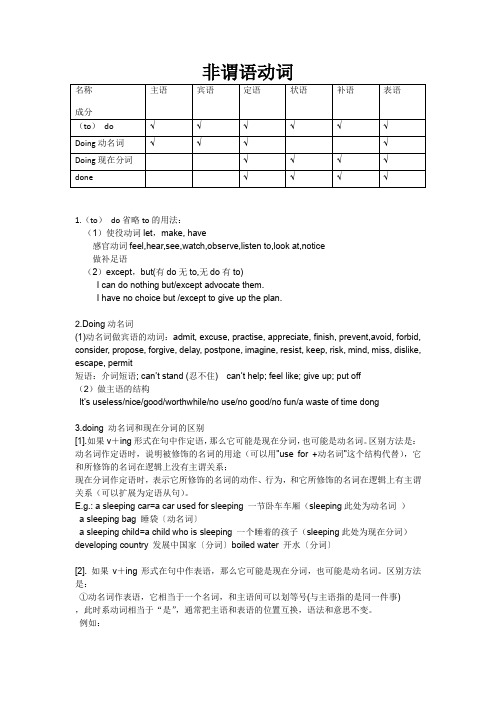
非谓语动词1.(to)do省略to的用法:(1)使役动词let,make, have感官动词feel,hear,see,watch,observe,listen to,look at,notice做补足语(2)except,but(有do无to,无do有to)I can do nothing but/except advocate them.I have no choice but /except to give up the plan.2.Doing动名词(1)动名词做宾语的动词:admit, excuse, practise, appreciate, finish, prevent,avoid, forbid, consider, propose, forgive, delay, postpone, imagine, resist, keep, risk, mind, miss, dislike, escape, permit短语:介词短语; can’t stand (忍不住) can’t help; feel like; give up; put off(2)做主语的结构It’s useless/nice/good/worthwhile/no use/no good/no fun/a waste of time dong3.doing 动名词和现在分词的区别[1].如果v+ing形式在句中作定语,那么它可能是现在分词,也可能是动名词。
区别方法是:动名词作定语时,说明被修饰的名词的用途(可以用"use for +动名词"这个结构代替),它和所修饰的名词在逻辑上没有主谓关系;现在分词作定语时,表示它所修饰的名词的动作、行为,和它所修饰的名词在逻辑上有主谓关系(可以扩展为定语从句)。
E.g.: a sleeping car=a car used for sleeping 一节卧车车厢(sleeping此处为动名词)a sleeping bag 睡袋〔动名词〕a sleeping child=a child who is sleeping 一个睡着的孩子(sleeping此处为现在分词)developing country 发展中国家〔分词〕boiled water 开水〔分词〕[2]. 如果v+ing形式在句中作表语,那么它可能是现在分词,也可能是动名词。
非谓语动词(一)

The Non-verbial 宣城二中 曹学成
I.非谓语动词时态、语态形式对照表: 及物与不及物 vt. vi. 主动语态 被动语态 主动语态 语态
类别 形式
一般式:(与谓语动词同时 making 发生且正在进行,) 完成式:(先于谓语动词之 having made 前发生) being made having been made made(表被动 表完成) to be made going having gone
4.非谓语动词的用法区别
不定式和动名词作宾语的区别:
• ⑴.下列动词常用不定式作宾语: aim ,ask, dare ,appear, arrange ,demand, help, hesitate, pay, plan, wait, fail, seek, prepare, happen, mean, prove, expect, wish, hope, decide, refuse, offer, learn, agree, choose, promise, pretend, manage, care, determine, afford等。 如:He offered to help us .
composition . We all like playing (to play) table tennis.
• 但也有细微区别: • *指具体某次的行为常用不定式,指惯常的行为 常用~ing形式. • 如:I like reading books of this kind.(惯常行为) • I hate to say so,but really I can't go with you.(具体某次行为)
I didn't expect to find you here. They refused to accept his invitation. The little boy pretended to be asleep when his mother came in.
非谓语动词(1)
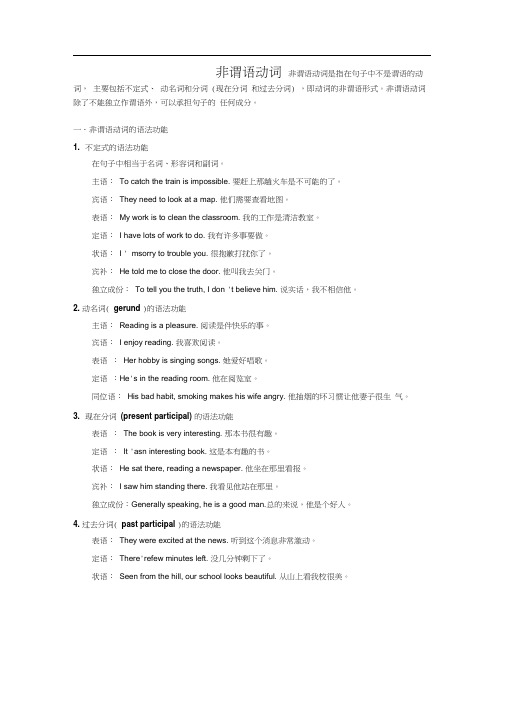
非谓语动词非谓语动词是指在句子中不是谓语的动词,主要包括不定式、动名词和分词 (现在分词和过去分词) ,即动词的非谓语形式。
非谓语动词除了不能独立作谓语外,可以承担句子的任何成分。
一.非谓语动词的语法功能1. 不定式的语法功能在句子中相当于名词、形容词和副词。
主语:To catch the train is impossible. 要赶上那趟火车是不可能的了。
宾语:They need to look at a map. 他们需要查看地图。
表语:My work is to clean the classroom. 我的工作是清洁教室。
定语:I have lots of work to do. 我有许多事要做。
状语:I ' msorry to trouble you. 很抱歉打扰你了。
宾补:He told me to close the door. 他叫我去关门。
独立成份:To tell you the truth, I don 't believe him. 说实话,我不相信他。
2. 动名词( gerund )的语法功能主语:Reading is a pleasure. 阅读是件快乐的事。
宾语:I enjoy reading. 我喜欢阅读。
表语:Her hobby is singing songs. 她爱好唱歌。
定语:He's in the reading room. 他在阅览室。
同位语:His bad habit, smoking makes his wife angry. 他抽烟的坏习惯让他妻子很生气。
3. 现在分词(present participal) 的语法功能表语:The book is very interesting. 那本书很有趣。
定语:It 'asn interesting book. 这是本有趣的书。
状语:He sat there, reading a newspaper. 他坐在那里看报。
英语非谓语动词用法详解(1)
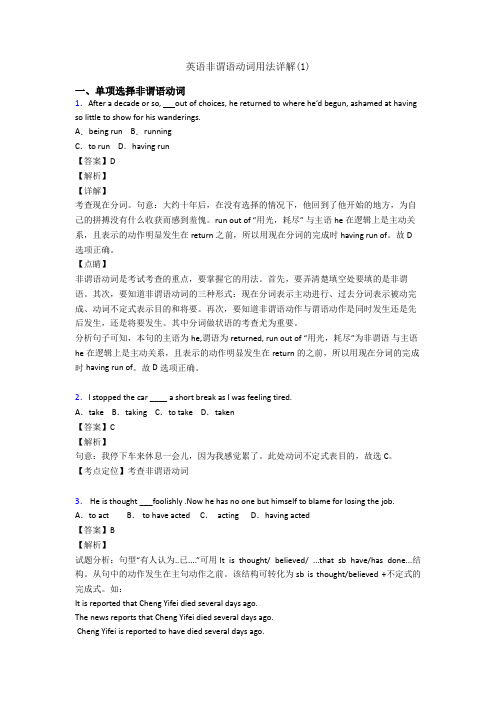
英语非谓语动词用法详解(1)一、单项选择非谓语动词1.After a decade or so, out of choices, he returned to where he’d begun, ashamed at having so little to show for his wanderings.A.being run B.runningC.to run D.having run【答案】D【解析】【详解】考查现在分词。
句意:大约十年后,在没有选择的情况下,他回到了他开始的地方,为自己的拼搏没有什么收获而感到羞愧。
run out of “用光,耗尽” 与主语he在逻辑上是主动关系,且表示的动作明显发生在return之前,所以用现在分词的完成时having run of。
故D 选项正确。
【点睛】非谓语动词是考试考查的重点,要掌握它的用法。
首先,要弄清楚填空处要填的是非谓语。
其次,要知道非谓语动词的三种形式:现在分词表示主动进行、过去分词表示被动完成、动词不定式表示目的和将要。
再次,要知道非谓语动作与谓语动作是同时发生还是先后发生,还是将要发生。
其中分词做状语的考查尤为重要。
分析句子可知,本句的主语为he,谓语为returned, run out of “用光,耗尽”为非谓语与主语he在逻辑上是主动关系,且表示的动作明显发生在return的之前,所以用现在分词的完成时having run of。
故D选项正确。
2.I stopped the car ____ a short break as I was feeling tired.A.take B.taking C.to take D.taken【答案】C【解析】句意:我停下车来休息一会儿,因为我感觉累了。
此处动词不定式表目的,故选C。
【考点定位】考查非谓语动词3. He is thought ___foolishly .Now he has no one but himself to blame for losing the job. A.to act B. to have acted C. acting D.having acted【答案】B【解析】试题分析:句型“有人认为..已....”可用It is thought/ believed/ ...that sb have/has done...结构。
非谓语动词(1)
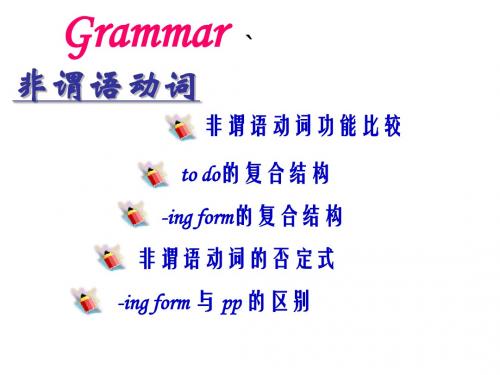
主语
It is + adj + of sb to do sth (of 引出 adj 修饰的对象) It is very kind of you to give me some help. =You are very kind to give me some help. It's impolite of you to speak to the teacher like that. =You are impolite to speak to the teacher like that. 注意:常用在 of 句型中的 adj 有: kind, good, nice, wise, unwise, clever, foolish, cruel, careless, stupid, naughty, polite, impolite, silly, wrong, brave, honest, noble,right, rude等
考点六: 动词 need, require, want 作“需要”解 + doing to be done
The window requires cleaning _____________. to be cleaned _____________.
定语和表语
moving, 1.The story was _________,we were moved all _________.(move) puzzled 2.There is a ________ expression on his face. Maybe the problem is too difficult for him.(puzzle) disappointing 3.With his son too____________, the father was sad.(dispoint)
语法复习――非谓语动词(一)动词-ing的用法讲解
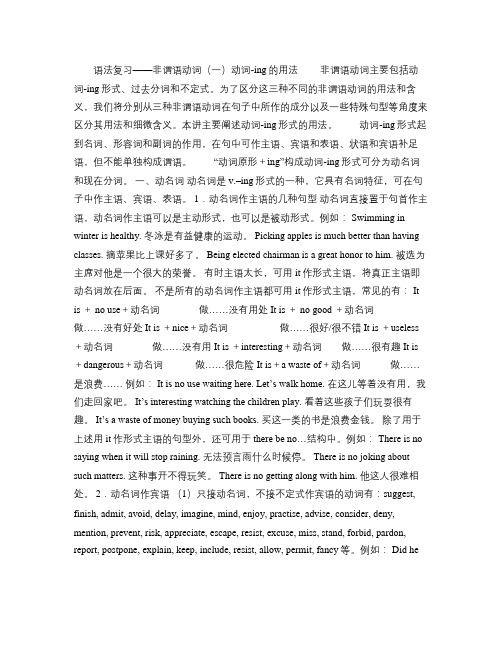
语法复习——非谓语动词(一)动词-ing的用法非谓语动词主要包括动词-ing形式、过去分词和不定式。
为了区分这三种不同的非谓语动词的用法和含义,我们将分别从三种非谓语动词在句子中所作的成分以及一些特殊句型等角度来区分其用法和细微含义。
本讲主要阐述动词-ing形式的用法。
动词-ing形式起到名词、形容词和副词的作用,在句中可作主语、宾语和表语、状语和宾语补足语,但不能单独构成谓语。
“动词原形+ing”构成动词-ing形式可分为动名词和现在分词。
一、动名词动名词是v.–ing形式的一种,它具有名词特征,可在句子中作主语、宾语、表语。
1.动名词作主语的几种句型动名词直接置于句首作主语,动名词作主语可以是主动形式,也可以是被动形式。
例如: Swimming in winter is healthy. 冬泳是有益健康的运动。
Picking apples is much better than having classes. 摘苹果比上课好多了。
Being elected chairman is a great honor to him. 被选为主席对他是一个很大的荣誉。
有时主语太长,可用it作形式主语,将真正主语即动名词放在后面。
不是所有的动名词作主语都可用it作形式主语,常见的有: It is + no use+动名词做……没有用处 It is + no good +动名词做……没有好处 It is +nice+动名词做……很好/很不错 It is +useless +动名词做……没有用 It is +interesting+动名词做……很有趣 It is +dangerous+动名词做……很危险 It is+a waste of+动名词做……是浪费…… 例如:It is no use waiting here. Let’s walk home. 在这儿等着没有用,我们走回家吧。
It’s interesting watching the children play. 看着这些孩子们玩耍很有趣。
非谓语动词(1)

非谓语动词非谓语动词(non-predicate verbs),又称作非限定动词(non-finite verbs),指不能单独用作谓语,而是充当其它语法功能的动词形式。
这类动词形式没有人称和数的变化,但可以有自己的宾语、状语等。
非谓语动词有三种:不定式(infinitive)、动名词(gerund)和分词(participle,有现在分词和过去分词之分)。
动词不定式不定式是指在句中无人称和数的限制,并在句子中起名词、形容词或副词作用的动词形式。
动词不定式有两种形式,一种是带to的不定式,另一种是不带to的不定式(bare infinitive,又被称为动词原形)。
其否定形式是在不定式符号to之前加not。
不定式不能作句子的谓语,但它又具有动词的某些特征,如可以带有自己的宾语,可以有状语修饰语等。
I 动词不定式的形态变化:动词不定式也有形态的变化,即一般式、进行式、完成式和被动式。
1.1 一般式:不定式的一般式表示的动作通常与谓语的动作同时或几乎同时发生,或是在其之后发生。
He appears to be very happy.To catch the train, we’d better hurry to the station by taxi.1.2 进行式:不定式的进行式表示正在进行的或与谓语动作同时发生的动作。
It happened to be raining when I got there.I’m glad to be travelling with you.1.3 完成式:不定式的完成式表示的动作在谓语动作之前发生。
I am sorry to have lost your key.I meant to have finished my work last night, but I didn't feel very well.It has been an honor for me to have been invited to your country.1.4 完成进行式:不定式的完成进行式表示的动作在谓语之前发生并且一直进行着。
非谓语动词1不定式-资料

动词不定式的时态
1 动词不定式
3 完成式:表示的动作发生在谓语动词表示的动作之前。
He seems to have caught a cold.
He seemed to have caught a cold. I am glad to meet you. I am glad to have met you.
1 动词不定式
动词不定式的时态 4 完成进行式:表示的动作发生在谓语动词表示的动作之前,且 动作带有持续性
She was said to have been living here for many years.
It is a real honor for me to have been working with you
动词不定式的语态
1 动词不定式
1 一般式被动语态: It is a real honor for me to be invited to this party
2 完成式被动语态:
This English novel is said to have been translated into Chinese
非谓语动词构成
• 动词不定式
• 动名词
• 分词
现在分词 过去分词
非谓语动词用法
非谓语动词没有人称和数的变化,但可以有自己的宾语, 状语等成分
We intend to watch a film later I saw Tom washing his car this morning
非谓语动词用法
It requires hard working to learn a new language
宾语:We are planning to leave
高三英语一轮复习——非谓语动词(一)

非谓语动词非谓语动词概念理解1形态变化2句法功能3用法辨析4非谓语动词概念理解形态特征仍保留动词的某些特征,如有自己的宾语,状语,有时态语态的变化等To play with fire is dangerous.Its purpose is to involve visitors in physical exercise and athletic competition .句法功能不能够在句中作谓语,只能充当谓语之外的成分做题启示:1. 句中不缺动词时,提示词为动词,则应考虑到非谓语2. 注意非谓语动词的完整性和形态意义非谓语动词类型非谓语动词(to)do v.-ing v.-ed不定式例句I began to feel dizzy.Volunteering gives you a chance to change lives, including your own. They seemed to be talking about something important.She pretended to be reading when her mother came in.She is said to have left Shanghai.Charles Babbage is generally considered to have invented the first computer.He is thought to have acted foolishly. Now he has no one but himself to blame for losing the job.She is said to have been writing the novel about New York for years.动词不定式形态试题解析答案[头脑风暴][针对训练]此处为非谓语动词作宾语的用法。
动词seem与不定式连用表示“看起来像是……”,由前句的一般过去时可知make这一动作已经完成,故使用完成式的不定式。
- 1、下载文档前请自行甄别文档内容的完整性,平台不提供额外的编辑、内容补充、找答案等附加服务。
- 2、"仅部分预览"的文档,不可在线预览部分如存在完整性等问题,可反馈申请退款(可完整预览的文档不适用该条件!)。
- 3、如文档侵犯您的权益,请联系客服反馈,我们会尽快为您处理(人工客服工作时间:9:00-18:30)。
/mean/forget/remember/regret/try/hope/wish/want/agree等词后, 可用不定式作宾语。
I really didn’t mean to trouble you .
The light is still on , I ‘ve forgotten to turn it off. 3)、作表语,表示一个未来的动作。
exam . 2) 、too……to do …… 太……而不能…… He was too tired to walk any farther . 当表语为:willing /early /easy/ready/glad等时,
非谓语动词
一、动词不定式
1、特点:动词不定式相当于名词、形容词及副词,在句中可做 主语、 宾语、表语、定语、补足语及状语。它也有动词的特点,有自己的主语, 有自己的宾语与状语,也有时态与语态之分。
2、形式: 一般式 to do 3、语态:
主动语态: 一般式 to do 进行式 to be doing 完成式 to have done
被动语态: 一般式 to be done 完成式 to have done
4、应用:
1)、做主语,表示一个具体的或将来的动作。 To learn English well is very important. To become a teacher is his dream .
当强调逻辑主语人时,常用it 作形式主语,用for sb 做逻辑主语, to do 放后。形式为:It is +adj +for sb +to do sth
My dream is become a doctor. 4)、作定语,与修饰的名词有动宾关系,如不定式为不及物动词, 后用介词,如不定式表示工具时,后也用介词。
Could you give me a stool to sit on ? Could you give me a pen to write with ? 5)、做补足语,与句子中的宾语有逻辑上的主谓关系。 A、带to 的不定式做补足语,谓语动词常可为: want/tell/ask/warn/urge/persuade/encourage/oblige/get/advise /suggest/ promise/allow/permit/wish/expect/drive /cause/bring等词+ sb +to do
例如:The mother told her son not to play in the street .
The sale’s man always brings us to buy the thing we needn’t buy .
Visitors aren’t allowed to smoke in public.
例如:It is important for us to learn English well. 如表示逻辑主语所做的动作产生影响后看法时,用of sb 形式。
即: It is +adj +of sb+ to do sth 这时表语形容词为:
careless、kind、wise unwise 、right、wrong、foolish 、stupid、silly 等词。 It’s foolish of him to do that thing . It’s kind of you to think so much of us . 2 )、作宾语,表示一个将来或未发生的动作,也可表示一个具体性
hand. 7)、不定式作状语
A、作目的状语 在in order to 、so as to 、go 、come 、stop 、stay 等 词后,用不定式,
表示目的。 In order to get to school on time ,he gets up early
every day . He stopped to have a resห้องสมุดไป่ตู้ on a stone by the road . B、结果状语 1)、so……as to do 如此……而以致于…… He studied so hard as to take the first place in the
I saw a boy enter the room just now.
A boy was seen to enter the room just now .
6)、用于独立主格结构中的补足语。
独立主格结构形式为:with +宾语+补足语 补足语常为:名词、形容词、不定式、现在分词、过去分词、副词、 介词短语等。 The boy , with the name LI dong , is my deskmate. In summer ,we often sleep with the window open . With him to lead us ,we had no difficulty in finding
the place .、 We have our class with the light burning /on He lay in bed, with his hands crossed under his head . Our teacher enter the classroom ,with a book in his
B、在使役动词have/make / let 词后,补足语不带to .make 用 于被动中,必带to ,have与let 无被动式。
The boy studies hard ,so he doesn’t need to be made to study hard .
C、在感官动词 see/watch/notice/observe/feel/find/hear/listen to/look at 等 词,不定式作补足语,表示一个曾经发生过的动作。不定式不带to , 但变成被动式时,不定式必带to .
